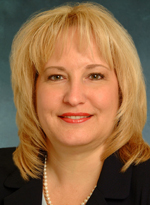When an EF-5 tornado blasted through Moore, Oklahoma, in May of 2013, the local 45-bed hospital was completely destroyed. But health records for more than 2 million patients in the entire Oklahoma City area were backed up by a regional health information exchange and stored safely in a data warehouse, so they remained intact.

Dee Cantrell
"Ubiquitous access to patient data, no matter where the patient presents for care, is a critical path to make sure that safe care happens," says Emory Healthcare CIO Dee Cantrell.
For the past three years, Cantrell and her team of information architects have been implementing a health information exchange, or HIE, at Emory to provide the infrastructure and mechanism by which Emory's own electronic medical record (EeMR, pronounced "eemer") can share information with other EMRs. Over the past year, they have begun the process of "on-boarding" other EMRs in the Emory Healthcare Network (which includes private practices throughout Georgia) to this HIE. And in February, HIE readiness allowed Emory to become the first provider to join the Georgia Health Information Network, or GaHIN.
Now most major provider systems in Georgia have become GaHIN members or are in queue to connect, says Cantrell, who chairs the GaHIN technology committee and who, along with her staff, has helped GaHIN enhance the on-boarding process for all providers.
GaHIN serves as a hub for Georgia providers to share patient data securely with one another and provides access to state immunization records and Medicaid claims data. "It connects health-related state agencies, service area HIEs, hospitals, clinics, physician practices, long-term care facilities, payers, labs, pharmacies, and academic health centers, and just recently, HealtheWay [a nonprofit, public-private collaborative that operationally supports the national eHealth Exchange]," says Cantrell.
Although it has "Georgia" in its name, GaHIN is not a state agency, but rather a 501c3 nonprofit organization, and it only exchanges data, as opposed to storing it. It was created with funds channeled through Georgia's Department of Community Health from ARRA, which contained a provision to give health care providers financial incentive, starting in 2011, to implement "meaningful use" of EMR technology. Starting in 2015, penalties will be imposed on providers lacking such technology.
The evolving process of working toward "ubiquitous" access to patient care data is complex, involving IT professionals, attorneys, compliance officers, privacy officers, clinicians, and others, says Cantrell. "The idea of having information available to other providers can feel uncomfortable at first, not for the IT people necessarily, but from other perspectives. Patient confidentiality, privacy, and security aspects are the biggest issues to work through. Legal issues can be a bigger challenge than technical ones."
Team member Jodi Tarpinian is on point to manage Emory's HIE and its interactivity with GaHIN. "Because we were the first to join, we often are asked to participate in discussions about privacy policies and procedures, what to put in contracts, data-use agreements, cultural differences among different organizations, and so on," she says. "It is an iterative process and takes time to build consensus."
Another Cantrell team member, information architect Julie Marquardt, faces a different set of complex issues to work through. She is responsible for Emory HIE on-boarding of physician practices in the Emory Healthcare Network. Currently, there are more than 50 different EMRs to assimilate or replace, and the task likely will take three to four years. "When you've seen one EMR, you've seen one EMR," she says.
Some niche specialty practices, for example, have EMRs that are super content-friendly to that specialty but lack generic interoperability with other EMRs. In the final analysis, each EMR will have to be meaningful-use certified to connect to the Emory HIE.
The fact that the Centers for Medicare and Medicaid Services recently identified Georgia as one of the leading states in health information exchange is thanks in no small part to the efforts of Cantrell and her colleagues. "We were late in the game," she says, "but we learned from earlier states' mistakes and from what they did well."

